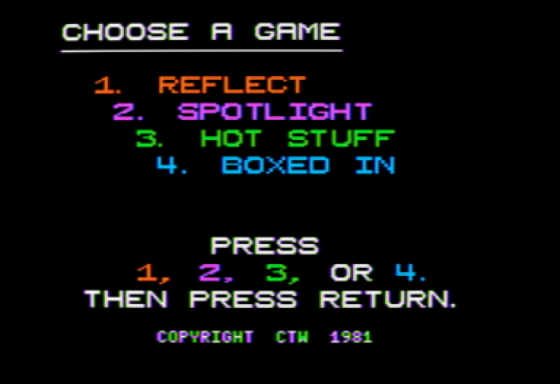
Database
 1st October 1985
1st October 1985
Categories: Review: Software
Author: Cliff McKnight
Publisher: Apple Computers
Machine: Apple II
Published in Apple User Volume 5 Number 10
Learning With The Sesame Street Gang
Some time ago, Apple decided it was not going to release any more software under its own name. Rather, it would give more support to third party developers. You may remember the Apple Special Delivery series that came to an end as a result of this decision. Personally, I didn't mourn the demise of that particular exercise.
However once series which Apple did "sponsor" and which deserved to do better was "Apple Presents..." produced in conjunction with the Children's Television Workshop (CTW). If you know CTW at all the chances are that you relate it to the Sesame Street TV programmes. Not surprisingly, then, the four packages I'm about to describe feature Sesame Street characters.
You may wonder why I'm bothering to describe software that's been around for some time. The reason is that it's just been made readily available again in this country and at an amazingly low price. On one of his trips to the States, Pete Fisher must have picked up a real bargain because P&P are offering these packages at £9.95 each. Considering that I recently saw the packages advertised at £34 each, the P&P price is very low.
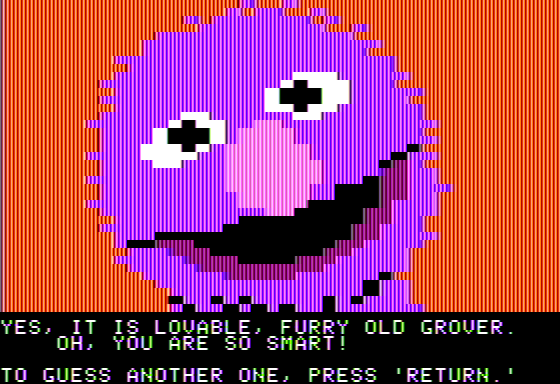
The question is: Are the packages worth £9.95 each or is this a case of software dumping?
To start off with, the packages are nicely presented with beginner-level manuals which also include follow-up activities and additional information.
Each pack contains not only a master disc but also a separate back-up. This was one of the few aspects of the Special Delivery range which I appreciated, and is an excellent policy with software designed to be used by children. The Mix and Match package is described as being appropriate for the whole family. It contains four separate games and a word editor.
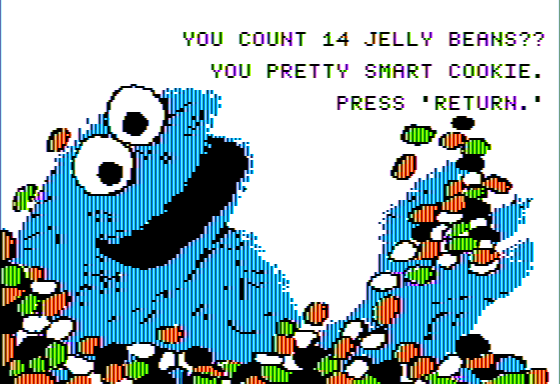
The Mix and Match game itself allows the child to choose a Muppet head, body and legs to create a new Muppet. A new name is created as a pastiche of three names. The Animal game is a version of Animals from the old DOS 3.3 Master Disc. It's nicely done with large text. The child can teach the program about various beasts and the new knowledge can be saved to the disc for future sessions.
Raise The Flags is an excellent implementation of Hangman, noteworthy for the fact that it is the only non-violent version I've ever encountered.
Letters are run up a set of flag-poles to make a word. It's really clear which letters have been used and the animation is simple but effective. The program contains two lists, one containing food words and the other nature words. Howver this is where the Word Editor comes in. With it you can make up your own list of words to be used by the game.
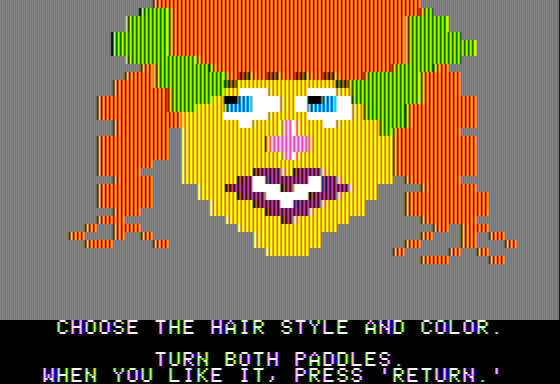
The Layer Cake is a thinly-disguised Towers of Hanoi problem with three layers of cake and three plates. There are a few bells and whistles when you solve it.
The Spotlight package id described as being for 9-13 year olds. It comprises four games with a distinct educational flavour. In Reflect you simulate shining a torch at a mirror. A paddle or joystick is used to change the angle of the mirror in order to do various things - light candles on a cake, hatch an egg and so forth. A performance score is given at the end in terms of number of times the target was hit and number of attempts.
Spotlight is effectively a more complicated version of Reflect. You are given ten shots at shining the spotlight to hit Steve as he walks about a stage. There's a screen blocking part of the stage and a fixed mirror which can be used in conjunction with the moveable mirror. Again, the game is non-violent - when Steve's hit he performs his song and dance routine.

Hot Stuff is a Cows and Bulls variant, which involves guessing three numbers and their order. The feedback is given in the form of "cold-warm-hot", with cold being a wrong number and hot being a number in its correct position.
There's a bit of animation to add a little extra interest and the meaning of the clues is clearly stated. The final game in this package is Boxed in, a 6x6 version of Reversi/Othello. Coordinates are used to specify moves. It doesn't play a very strong game but it's good enough for the target age-range.
The Instant Zoo package is aimed at 7-10 year olds. Again there are four games and a word editor. The game of Instant Zoo is a lo-res animal guessing game. Random blocks of the screen are filled and the children have to press Esc when they want to guess the animal.
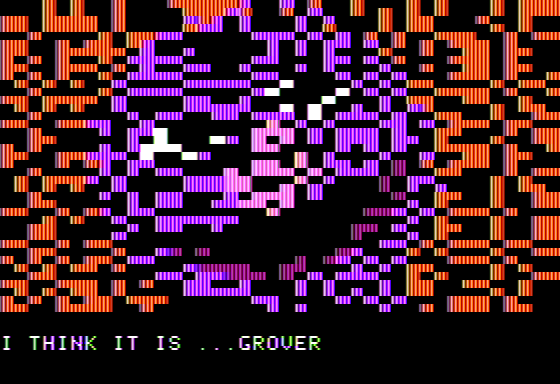
Some of the animals are clearer in colour, but most of them are recognisable in monochrome. My junior play-testers seemed to have no trouble with a green screen monitor.
Star Watch is a reaction time tester. Some stars are drawn on the screen and after a few moments one of them starts to move. The child's task is to press the Space bar as soon as any movement is seen. The faster the reaction, the more stars appear on the screen.
Quick Match is a version of Snap based on words and incorporating a time factor. There are three levels of difficulty, and on the hard level the words are similar enough to be quite challenging - such as 'clan' and 'clam'.

Alternatively you can use the word editor to add your own list. The words are added in pairs and the program simply choose one of the pair, and displays it twice when it wants to 'snap'.
Scramble, as the name suggests, is an anagram game. The program contains two lists of words - sport and parts of the body - but once again the word editor can be used to input your own choice of words.
If you don't guess the answer within the time, the letters are re-arranged into an order closer to the word. Points are related to the speed with which the answer is given.
Ernie's Quiz
The fourth package in the series, Ernie's Quiz, is aimed at 4-7 year olds.
The Guess Who game is very similar to Instant Zoo but this time the characters that appear are Muppets rather than animals. This has the disadvantage that you need to know the Muppets a little. If, like me, you can't tell your Bert from your Big Bird this game may give you a few problems the first few times through.
Of course the popularity of the Muppets means that most children would have less trouble than me with this game.
Jelly Beans is a counting game using Cookie Monster to reinforce right answers. The numbers may be too high - say 25 - for some four year olds but seven year olds should have no problems.
Face-It is a sort of lo-res Identikit in which you build up a face from offered parts. Paddles, or a joystick, are necessary to cycle through the available bits, with Return being used to select a feature.
Ernie's Quiz starts by showing pictures of several Muppets. Word clues are then given and you must choose one of three Muppets on the basis of the clue. When you get the right answer the response is in keeping with the Muppet. For example, Ernie will play a trick on you and show himself on the text screen version of lo-res.
There is a nice sense of humour in all the packs. They make good use of the Apple's graphics and the only way they show their age is in sometimes taking a while to load. Once loaded, all four packages ran without a hitch. So, are the packages worth £9.95 each? I certainly think so. In fact, they'd be reasonably priced at twice that amount.
Although my children very rarely watch Sesame Street, even they knew enough to have fun with the Muppet-based games, and there's enough variety and challenge to keep everyone occupied. All in all, the packages display the thoughtful approach which typifies the Children's Television Workshop. I only wish more educational software was of such quality.
If Apple had sponsored more of this and less of the Special Delivery series, it might not have been forced out of the software market.

